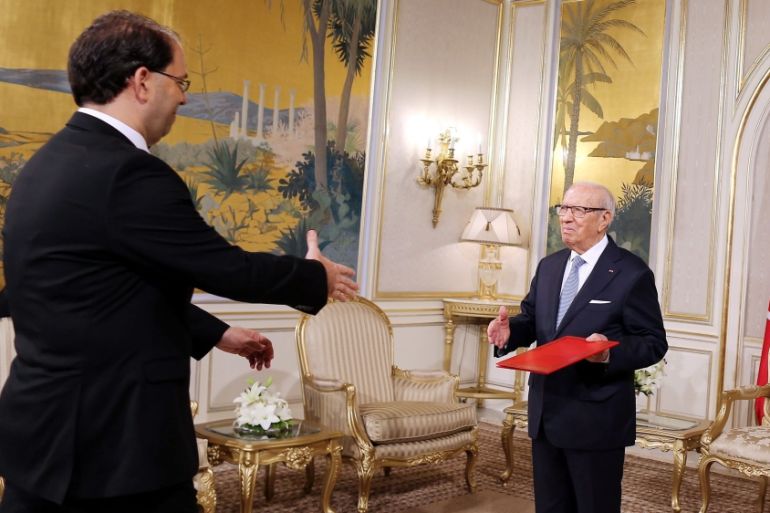Tunisian president names Youssef Chahed as new PM
Youssef Chahed, the prime minister-designate, warns Tunisians to brace themselves for “exceptional sacrifices”.

Tunisia’s President Beji Caid Essebsi has named Youssef Chahed as prime minister after parliament ousted Habib Essid in a vote of no-confidence because of his handling of economic reforms and security.
Chahed, 41, a former minister for local affairs, announced the appointment himself on Wednesday, warning Tunisians to brace themselves for “exceptional sacrifices”.
Keep reading
list of 4 itemsControversial law sparks fist fight in Georgian parliament
‘Prejudice, Islamophobia’: Free speech fears as UK redefines extremism
Dominican FM on Haiti gang violence crisis: Spillover threat?
“The president has put me in charge of the national unity government. This is a message of confidence for young people also,” Chahed said. “In this delicate time we need a lot of audacious decisions.”
Essebsi had been pushing for a new national unity government in an attempt to overcome political infighting in the ruling coalition and more efficiently tackle economic reforms and the security threat.
READ MORE: Outcry as Tunisian president proposes relative for PM
Chahed dismissed reports he had any family ties to Essebsi, responding to opposition charges that he was a distant relative of the president.
The nomination was likely to be approved by a parliamentary vote, as required.
The parliament has a month to do so, but the vote could come sooner. Chahed said he could start consultations to form a new government on Wednesday.
He said the government would be a “government of youths” with more female ministers than the three in the outgoing cabinet and favouring no one party.
“Today, we enter into a new stage that demands efforts and exceptional sacrifices and boldness to find out-of-the-box solutions to the nation’s problems,” Chahed said. “We will speak frankly to the people about the reality of the country’s financial and economic situation.”
Chahed, setting out priorities, said the first is the war on “terrorism”.
Hope in the future
The North African nation wedged between Algeria and Libya suffered two major attacks last year – at a beach resort and the well-known Bardo Museum – that killed around 60 people, mainly tourists.
He said fighting corruption should be another priority, along with increasing growth to create jobs. Growth is currently hovering at zero. He singled out the nation’s youths, saying they “must not lose hope in the future”.
Since its 2011 revolution to oust Zine El Abidine Ben Ali, Tunisia has grown into a democracy praised as a model for the region.
But security issues have tested the government and political infighting has slowed economic progress needed to ease social tensions especially among ranks of young employed.
|
|